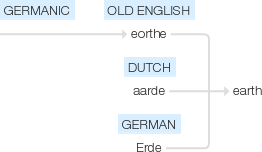Earth
Old English eorthe, of Germanic origin; related to Dutch aarde and German Erde .
wiktionary
From Middle English erthe, from Old English eorþe(“earth, ground, soil, dry land”), from Proto-West Germanic *erþu, from Proto-Germanic *erþō(“earth, ground, soil”) (compare West Frisian ierde, Low German Eerd, Dutch aarde, Dutch Low Saxon eerde, German Erde, Danish, Swedish and Norwegian jord), related to *erwô(“earth”) (compare Old High German ero, perhaps Old Norse jǫrfi), from Proto-Indo-European *h₁er- (compare Ancient Greek *ἔρα(*éra) in ἔραζε(éraze, “on the ground”), perhaps Tocharian B yare(“gravel”).
Probably unrelated, and of unknown etymology, is Old Armenian երկիր(erkir, “earth”). Likewise, the phonologically similar Proto-Semitic *ʔarṣ́- – whence Arabic أَرْض (ʾarḍ), Hebrew אֶרֶץ (ʾereṣ) – is probably not related.
etymonline
earth (n.)
Old English eorþe "ground, soil, dirt, dry land; country, district," also used (along with middangeard) for "the (material) world, the abode of man" (as opposed to the heavens or the underworld), from Proto-Germanic *ertho (source also of Old Frisian erthe "earth," Old Saxon ertha, Old Norse jörð, Middle Dutch eerde, Dutch aarde, Old High German erda, German Erde, Gothic airþa), perhaps from an extended form of PIE root *er- (2) "earth, ground."
The earth considered as a planet was so called from c. 1400. Use in old chemistry is from 1728. Earth-mover "large digging machine" is from 1940.
earth (v.)
"to commit (a corpse) to earth," late 14c., from earth (n.). Related: Earthed; earthing.
